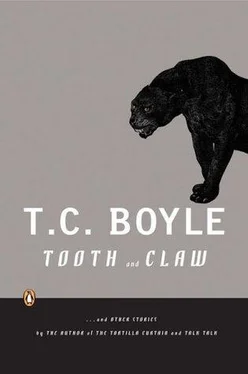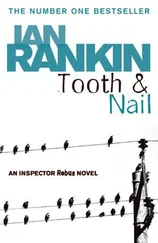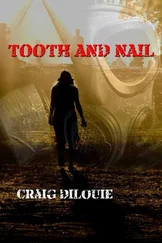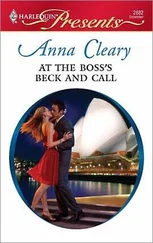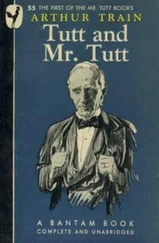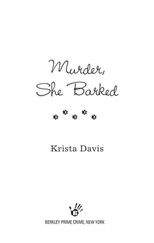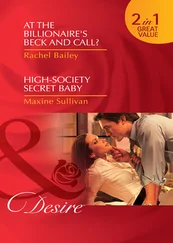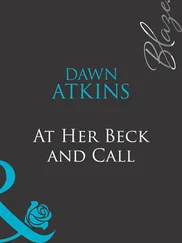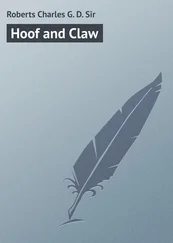The wind skreeled off down the street, carrying bits of paper, cans, bottles, old bones and rags and other refuse along with it. The bird woman’s eyes blinked open. Robbie Baikie, all fifteen stone of him, lay pressed atop her in a defensive posture, anticipating the impact of the car, and he hadn’t even thought to prop himself on his elbows to take some of the crush off her. Junie Ooley smelled the beer on him and the dulcet smoke of his pipe tobacco and the sweetness of the peat fire at Magnuson’s and maybe even something of the sheep he kept, and she couldn’t begin to imagine who this man was or what he was doing on top of her in the middle of the public street. “Get off me,” she said in a voice so flat and calm Robbie wasn’t sure he’d heard it at all, and because she was an American woman and didn’t commonly make use of the term “clod,” she added, “you big doof.”
Robbie was shy with women — we all were, except for the women themselves, and they were shy with the men, at least for the first five years after the wedding — and he was still fumbling with the notion of what had happened to him and to her and to Duncan Stout’s automobile and couldn’t have said one word even if he’d wanted to.
“Get off,” she repeated, and she’d begun to add physical emphasis to the imperative, writhing beneath him and bracing her upturned palms against the great unmoving slabs of his shoulders.
Robbie went to one knee, then pushed himself up even as the bird woman rolled out from under him. In the next moment she was on her feet, angrily shifting the straps of her rucksack where they bit into the flesh, cursing him softly but emphatically and with a kind of fluid improvisatory genius that made his face light up in wonder. Twenty paces away, Duncan was trying to extricate himself from his car, but the wind wouldn’t let him. Howith Clarke, the greengrocer, was out in the street now, surveying the damage with a sour face, and Magnus was right there in the middle of things, his voice gone hoarse with excitement. He was inquiring after Junie Ooley’s condition—“Are you all right, lass?”—when a gust lifted all four of them off their feet and sent them tumbling like ninepins. That was enough for Robbie. He picked himself up, took hold of the bird woman’s arm and frog-marched her into the pub.
In they came, and the wind with them, packets of crisps and beer coasters sailing across the polished surface of the bar, and all of us instinctively grabbing for our hats. Robbie’s head was bowed and his hair blown straight up off his crown as if it had been done up in a perm by some mad cosmetologist, and Junie Ooley heaving and thrashing against him till he released her to spin away from him and down the length of the bar. No one could see how pretty she was at first, her face all deformed with surprise and rage and the petulant crease stamped between her eyes. She didn’t even so much as look in our direction, but just threw herself back at Robbie and gave him a shove as if they were children at war on the playground.
“What the hell do you think you’re doing?” she demanded, her voice piping high with her agitation. And then, glancing round at the rest of us: “Did you see what this big idiot did to me out there?”
No one said a word. The smoke of the peat fire hung round us like a thin curtain. Tim Maconochie’s Airedale lifted his head from the floor and laid it back down again.
The bird woman clenched her teeth, set her shoulders. “Well, isn’t anybody going to do anything?”
Magnus was the one to break the silence. He’d slipped back in behind the bar, unmindful of the chaff and bits of this and that that the wind had deposited in his hair. “The man saved your life, that’s about all.”
Robbie ducked his head out of modesty. His ears went crimson.
“Saved—?” A species of comprehension settled into her eyes. “I was…something hit me, something the wind blew…”
Tim Maconochie, though he wasn’t any less tightfisted than the rest of us, cleared his throat and offered to buy the girl a drop of whisky to clear her head, and her face opened up then like the sun coming through the clouds so that we all had a good look at the beauty of her, and it was a beauty that made us glad to be alive in that moment to witness it. Whiskies went round. A blast of wind rattled the panes till we thought they would burst. Someone led Duncan in and sat him down in the corner with his pipe and a pint of ale. And then there was another round, and another, and all the while Junie Ooley was perched on a stool at the bar talking Robbie Baikie’s big glowing ears right off him.
THAT WAS THE BEGINNING of a romance that stood the whole island on its head. Nobody had seen anything like it, at least since the two maundering teens from Cullivoe had drowned themselves in a suicide pact in the Ness of Houlland, and it was the more surprising because no one had ever suspected such depths of passion in a poor slug like Robbie Baikie. Robbie wasn’t past thirty, but it was lassitude and the brick wall of introspection that made him sit at the bar till he carried the weight of a man twice his age, and none of us could remember him in the company of a woman, not since his mother died, anyway. He was the sort to let his sheep feed on the blighted tops of the heather and the wrack that blew up out of the sea and he kept his heart closed up like a lockbox. And now, all of a sudden, right before our eyes, he was a man transformed. That first night he led Junie Ooley up the street to her lodgings like a gallant out of the picture films, the two of them holding hands and leaning into the wind while cats and flowerpots and small children flew past them, and it seemed he was never away from her for five minutes consecutive after that.
He drove her all the wind-blasted way out to the bird sanctuary at Herma Ness and helped her set up her equipment in an abandoned crofter’s cottage of such ancient provenance that not even Duncan Stout could say who the landlord might once have been. The cottage had a thatched roof, and though it was rotted through in half a dozen places and perfervid with the little lives of crawling things and rodents, she didn’t seem particular. It was in the right place, on a broad barren moor that fell off into the sea amongst the cliffs where the birds made their nests, and that was all that mattered.
There was no fuss about Junie Ooley. She was her own woman, and no doubt about it. She’d come to see and study the flocks that gathered there in the spring — the kittiwakes, the puffins, terns and northern fulmars nesting the high ledges and spreading wide their wings to cruise out over the sea — and she had her array of cameras and telephoto lenses with her to take her photographs for the pricey high-grade magazines. If she had to rough it, she was prepared. There were the cynical amongst us who thought she was just making use of Robbie Baikie for the convenience of his Toyota minivan and the all-purpose, wraparound warmth of him, and there was no end to the gossip of the biddies and the potboilers and the kind who wouldn’t know a good thing if it fell down out of Heaven and conked them on the head, but there were those who saw it for what it was: love, pure and simple.
IF ROBBIE NEVER much bothered about the moorits and Cheviots his poor dead and buried father had bred up over the years, now he positively neglected them. If he lost six Blackface ewes stranded by the tide or a Leicester tup caught on a bit of wire in his own yard, he never knew it. He was too busy elsewhere. The two of them — he and the bird woman — would be gone for a week at a time, scrabbling over the rock faces that dropped down to the sea, she with her cameras, he with the rucksack and lenses and the black bottles of stout and smoked-tongue sandwiches, and when we did see them in town they were either taking tea at the hotel or holding hands in the back nook of the pub. They scandalized Mrs. Dunwoodie, who let her rooms over the butcher’s shop to Junie Ooley on a monthly basis, because she’d seen Robbie coming down the stairs with the girl on more than one occasion and once in the night heard what could only have been the chirps and muffled cries of coital transport drifting down from above. And a Haroldswick man — we won’t name him here, for decency’s sake — even claims that he saw the two of them cavorting in the altogether outside the stone cottage at Herma Ness.
Читать дальше
